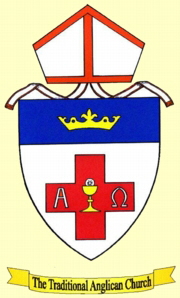The Traditional Anglican Church in Britain is an unincorporated body. We have several times considered registering as a charity, but have concluded that this is too dangerous as we might be forced to adopt erroneous practices.
Our constitution is derived from the original state of the "Fisher" canons of the Church of England. In that body, some have been amended beyond recognition and others have lapsed because they are not enforced. We take our own canons seriously, though some of them are not fully applicable in our current straitened circumstances.
An important principle of adaptation was that we should not make false claims. We are not the Church of England by law established; we cannot make the King our Supreme Governor; we do not have access to the Church courts; we cannot have officers such as churchwardens which are specific to that body.
All the important issues are defined in the first section of the canons, which is accordingly reproduced here. Please note that the canons have recently been revised in order to reflect the change from the Traditional Anglican Communion (within which we were a church) to the Traditional Anglican Church (of which we are a province).
Of the Traditional Anglican Church The Traditional Anglican Church in Britain is part of the One, Holy, Catholic and Apostolic Church of Christ; and as our duty to the said Traditional Anglican Church in Britain requires. we do constitute and ordain that no member thereof shall be at liberty to maintain or hold the contrary. This Church, as a province of the Traditional Anglican Church, accepts the Constitution of the said Traditional Anglican Church.
Of the Doctrine of the Traditional Anglican Church The doctrine of the Traditional Anglican Church is grounded in the Canonical Scriptures of the Old and New Testaments and in such teachings of the ancient Fathers and Councils of the Church as are agreeable to the said Scriptures. In particular such doctrine into be found in the Thirty-nine Articles of Religion, the Book of Common Prayer and the Ordinal.
Of the Thirty-nine Articles of Religion The Thirty-nine Articles are agreeable to the Word of God and may be assented unto with a good conscience by all members of the Traditional Anglican Church.
Of the Book of Common Prayer The doctrine contained in The Book of Common Prayer and Administration of the Sacraments and other Rites and Ceremonies of the Church is agreeable to the Word of God. The form of God's worship contained in the said Book, forasmuch as it is not repugnant to the Word of God, may be used by all members of the Traditional Anglican Church with a good conscience.
Of the Ordinal The form and Manner of Making, Ordaining and Consecrating of Bishops, Priests and Deacons, annexed to the Book of Common Prayer and commonly known as the Ordinal, is not repugnant to the Word of God; and those who are so made, ordained or consecrated Bishops, Priests or Deacons according to the said Ordinal, are lawfully made, ordained or consecrated and ought to be accounted, both by themselves and others, to be truly Bishops, Priests or Deacons.
Of the Government of the Traditional Anglican Church The government of the Traditional Anglican Church by Archbishops. Bishops, Deans, Provosts Archdeacons and the rest of the clergy and of the laity that bear office in the same is not repugnant to the Word of God.
Of Schisms Forasmuch as the Church of Christ has for a long time part been distressed by separations and schisms among Christian men, so that the unity for which our Lord prayed is impaired and the witness to his gospel is grievously hindered, it is the duty of clergy and people to do their utmost not only to avoid occasions of strife but also to seek in penitence and brotherly charity to heal such divisions. This Church desires to be in full Communion with the whole of the One, Holy, Catholic and Apostolic Church of Christ and in endeavouring to promote Christian Unity, shall continue to regard as the minimum basis for such unity the sharing of common Scriptures, Creeds, Sacraments and Ministry, as identified in the Chicago-Lambeth Quadrilateral of 1886-88.
The remainder of the canons are for the most part only of internal interest. We have retained the vestment canon and the 1604 canon on the secrecy of the confessional. We have provided for the choice of bishops. The complete canons can be provided on request.
